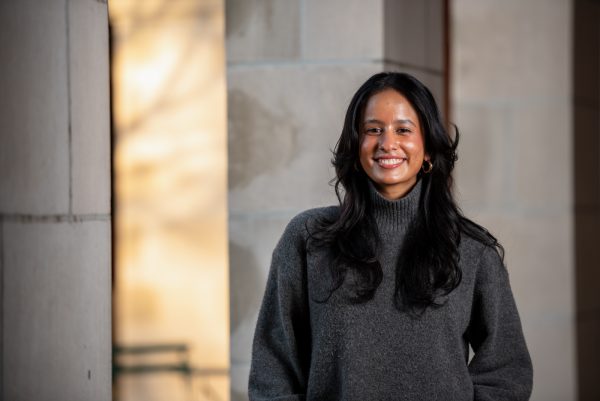Eileen Gu embraces multicultural identity
Eileen Gu’s decision to compete for China is inspiring.
February 24, 2022
“When I’m in the U.S., I’m American. When I’m in China, I’m Chinese.” When I read this statement for the first time, I couldn’t help but pause. What struck me was the ease with which this phrase settled with me.
Eileen Gu is an 18-year-old freestyle skier, born and raised in San Francisco CA, who took the 2022 Winter Olympics by storm, winning three medals for China. I watched her dominate every competition in awe, despite the heavy controversy that undoubtedly weighed on her shoulders — one which began a couple of years prior.
In 2019, Gu won the gold medal for the U.S. at the World Cup, allowing her to compete in the Olympics. A couple of days later, she met with Chinese President Xi Jinping and was offered a spot on China’s Olympic team. The decision was up to her.
Depending on who you ask, what seems like an obvious answer to this offer is far from it. I can’t imagine what Gu went through during the four months she waited to make her decision, but I can understand some of the confusion. To many, this decision would define her identity, and the turmoil hurts.
I am an American citizen who was born in Singapore and raised in New Delhi, India. Using Gu’s words, when I’m in the U.S., I’m American. When I’m in India, I’m Indian. I get it. But not many people do, and it can be a struggle.
Today, Gu is loved by millions of people from all over the world — many from both the U.S. and China. Gu shared that her desire when joining Team China was to unite the two countries she called home. It’s noble.
Giving China a symbol of success for the Winter Olympics does not have to be labeled a betrayal, but as a society, we are so insistent on labeling others. We let these labels heavily influence our perceptions of those around us.
But what if someone needs multiple labels? In the U.S., people like Will Cain — a host for Fox News — are opposed to her decision. They believe Gu took advantage of America’s resources and “[turned] her back on that in exchange for money”.
Furthermore, Chinese social media influencers such as Zhang Cailing and Chen Xiaoyu are also critical of Gu. Both argue against the similarity of Gu’s upbringing to girls in China and thus believe she should not be advertised as a role model.
To people who agree with all three of them I ask, what about the men?
There are currently multiple white American men representing Team China in the Olympics. Some names include Jeremy Smith — who goes by Jieruimi Shimisi when playing — and Jake Chelios — who goes by Jieke Kailiaosi. Both represented the Chinese ice hockey team in the 2022 Winter Olympics, despite having no previous connection to China.
If there was any backlash, it wasn’t publicized. Gu’s story is being twisted to tell young women what they can or can’t identify as — but she continues to resist.
In an interview questioning her choices, Gu responded that “people sometimes don’t know what to do with other people when they’re not fitting in a box”. I’ve found this to be true.
I went to an American international school in New Delhi, and all of my friends spread across the globe. We were used to a complicated response to a simple question: “where are you from?” I didn’t realize how rare this community was until I moved back to the U.S. for college.
I am in no way comparing my childhood to Gu’s predicament regarding which Olympic team to compete for. But to those who think her decision was wrong — selfish even — I wanted to provide thoughts from someone who gets it, as I’m sure many do at Wake Forest.
Gu was raised by two strong Chinese women who didn’t let her forget her Chinese heritage amidst inevitable American influence. Feeling at home in multiple places is a beautiful thing, something my parents have also always attempted to help me understand.
But honestly, it still just sucks sometimes. I don’t like the nervous butterflies I get when someone asks me where I’m from, whether here or in India. In the U.S., it’s rare for people to think I’m Indian as well as American. In India, my accent is enough to mark me as a foreigner.
So to Gu, rising Stanford freshman, IMG model, Met Gala attendee and recipient of many luxury sponsorships, I say that I am proud of you for doing what feels right for you. You get up every day to help girls worldwide pursue freeskiing — among other passions — but what you might not realize is that you are inspiring people like me not to settle. Our multicultural backgrounds should not be ignored, but embraced.













